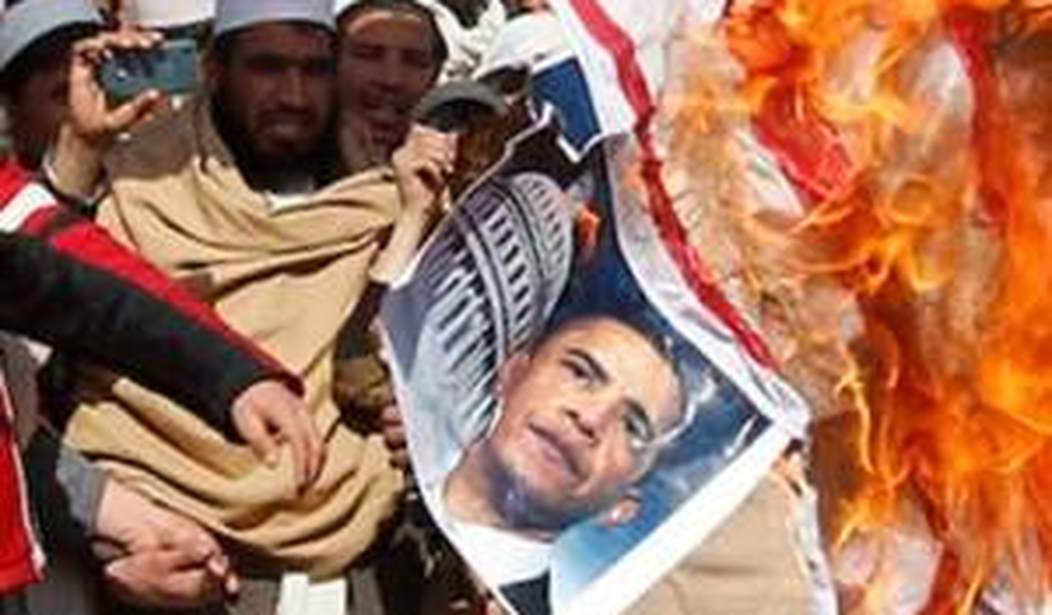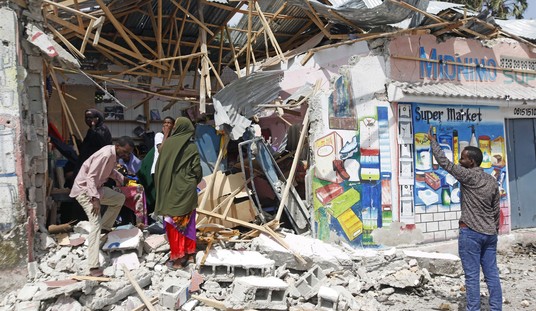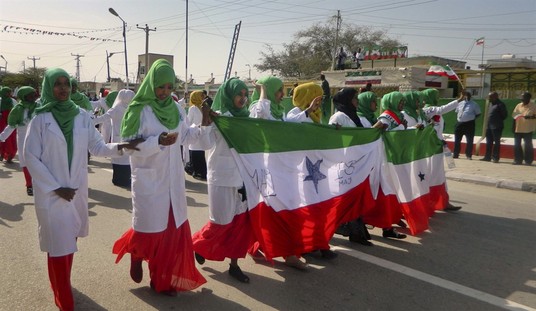WASHINGTON — The House Homeland Security Committee today heard from a panel including two former Democratic lawmakers and a four-star general that al-Qaeda is not on the run and the nation’s safety depends on recognizing “this cancer out there.”
And there was a strong message to a White House accused of ignoring mounting terrorist growth in Africa, the Middle East and the Caucasus region while fixating on the assassination of Osama bin Laden and a “decimated” core of his terror organization.
“Mr. President, there are three more years in which you’re going to be commander in chief,” former Sen. Joe Lieberman (I-Conn.) testified. “A lot of what you’re doing now is not protecting our security and diminishing our credibility.”
Chairman Mike McCaul (R-Texas) said he called the hearing because “the president’s rhetoric on the threat of al-Qaeda and its franchises are in stark contrast to the reality we are witnessing in the Middle East and Northern Africa.”
“Protecting this nation requires that we correctly identify the threats against it. It also requires that the United States lead on the world stage. I am increasingly concerned that we are doing very little of both,” he added, giving the Fort Hood “workplace violence” designation and Benghazi as examples.
“Foremost in the narrative is the administration’s frequent use of the ‘core al-Qaeda’ concept. This is a false construct in my judgement and misleading for a number of reasons. Today, there is no central al-Qaeda nucleus. References to a ‘core al-Qaeda’ imply that its defeat would dismantle terrorist efforts around the world and eliminate the terrorist threat to the homeland. This is not the case. Over time, the term ‘al-Qaeda’ has come to symbolize an ideology of hate toward the West with a goal of establishment of a caliphate, rule by Sharia law and the pathway there through violent jihad,” McCaul continued.
“Terrorist groups are multiplying. They are spreading like wildfire across Northern Africa…Our lack of leadership has damaged our standing in the world, and created a power vacuum being filled by terrorists who are prospering in our absence.”
Lieberman, Al Gore’s onetime running mate who went independent in 2006 after he was defeated in a Democratic primary over his hawkish foreign policy, said after 9/11 “the overwhelming focus of our government and of the American people was on the threat of terrorism.”
“Twelve years later, that is no longer the case,” he added, noting that the decreased attention stems from the lack of catastrophic attacks on the homeland since 2001.
“Pride in this achievement, however, must be tempered by an awareness of several harsh realities. First, al Qaeda and its affiliates remain a ruthless, determined, and adaptive adversary. Second, the underlying ideology that inspires and drives al-Qaeda to attack us and our allies—the ideology of violent Islamist extremism — is neither defeated nor exhausted,” Lieberman said. “It manifests itself not just in al-Qaeda but in terrorist organizations that are either unaffiliated with al-Qaeda or loosely affiliated with it.”
Lieberman criticized voices “on both sides of the political spectrum” who say the terror threat is receding or advocate isolation as “badly and dangerously mistaken.”
“Put very bluntly, I do not see a credible or coherent U.S. strategy right now for exactly those countries — Syria, Iraq, and Libya — that most threaten to emerge as al-Qaeda’s newest and most dangerous footholds — places, from which terrorist attacks against our homeland can and will originate,” he said.
One estimate puts more foreign fighters in Syria now than in Iraq and Afghanistan combined over the past decade as jihadists fight against the Free Syrian Army.
“This failure, it should be added, has consequences for our national security that extend far beyond counterterrorism. Across the Middle East and beyond, the credibility of American leadership is being questioned as it has not been for a very long time. Among friends and enemies alike, there are doubts about our staying power; questions about our reliability as an ally; and suspicions that, at the end of the day, we will hesitate to back up our promises and historic commitments with the use of force — if necessary,” Lieberman continued. “This is the reality of how the United States is seen right now in too much of the rest of the world.”
“The Obama administration has repeatedly narrowed the rhetorical scope of this conflict from what it criticized as an amorphous and open-ended ‘war on terrorism’ to an armed conflict against a discrete and identifiable group: al-Qaeda and its affiliates,” a strategy he called “inadequate” because “al-Qaeda as an organization can be eviscerated, but it will regenerate as long as the ideology that inspires it survives.”
Former Rep. Jane Harman (D-Calif.) told the committee that “the problem with the U.S. narrative is not that we are underplaying the terror threat.”
“We are inadequately explaining our agenda to people in the U.S. – and in the region,” she said. “If we leave a vacuum, the bad guys fill it with their narrative.”
However, Harman predicted that if Secretary of State John Kerry is successful with a “heroic” Mideast peace deal and the Iran nuclear deal, it will “reset how the U.S. viewed.”
Retired four-star Army Gen. Jack Keane, who co-authored a policy paper that inspired the Iraq surge in the George W. Bush era, told the lawmakers “it is not true that our alliances are stronger, indeed, they are weaker because our allies are fundamentally questioning the ‘will’ of the United States; many allies believe the U.S. will not be there for them in a time of peril and, sadly, U.S. standing in the world is at its lowest since prior to WWII.”
“When American leadership is strong in the world, the world is a safer place. And when American leadership is inconsistent, indecisive, and we are willing to permit others to lead who do not have the capacity or when we are paralyzed by the fear of adverse consequence, then American leadership is weak and the world is a more dangerous place,” Keane continued. “As such, our adversaries are emboldened, they become more aggressive, they take more risks and the results are more death, more casualties and the security of the American people is threatened. Tragically, this is where we are today.”
The general stressed “the harsh reality is that radical Islam and the al-Qaeda affiliates are on the rise and the evidence is overwhelming.”
Keane highlighted the “strategic blunder” of leaving no residual force in Iraq and the danger of making the same mistake in Afghanistan, noting without support for Kabul the Taliban will “truly threaten the regime” and al-Qaeda will “return to their most desirable sanctuary, the mountains of Afghanistan.”
“Because of the failure of American leadership the term radical Islam or Islamic extremism is not mentioned in U.S. policy, which is quite astounding,” Keane said. “…What makes this movement the most threatening we have ever faced is their stated objectives to use WMD against the people of the U.S. Unchecked, radical Islam is an ideological struggle with the U.S. and its allies that will dominate most of the 21st century.”
Under questioning from lawmakers, Keane further stressed that “al-Qaeda becoming decentralized has always been part of the plan” with a strategy of spreading out across the globe in countless affiliate networks.
“Sometimes the world doesn’t cooperate with a presidential narrative and I think that’s where we are,” Lieberman said, noting there’s “something in between” sending in military forces “and just pulling out.”
If the U.S. doesn’t support the non-jihadist, anti-Assad Syrians, the Iraqi government in the fight against al-Qaeda, or the Libyans trying to build a post-Gadhafi country, “we’re going to get attacked again,” the former senator stressed. “Then we’re going to have to go back in there and risk even more American lives… if we just turn away we’re going to suffer.”
Lieberman noted that the only reason the al-Qaeda “core” in the Af-Pak region has been diminished is because of military force. “Al-Qaeda is not a social organization,” he said. “It is a brutal military organization.”
In the meantime, he said, American policy is “inviting the whirlwind.”
“There are large parts of the Obama administration’s strategy that are simply not working. This is going to go on for a large part of this century,” Lieberman said of the “fearless and ideologically driven killing machine” of Islamic terrorism.
“In the end, if we do nothing, the result will be worse.”









Join the conversation as a VIP Member